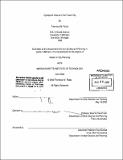Cyberpunk visions of the future city
Author(s)
Rojas, Francisca M., 1976-
DownloadFull printable version (15.73Mb)
Other Contributors
Massachusetts Institute of Technology. Dept. of Urban Studies and Planning.
Advisor
Dennis Frenchman.
Terms of use
Metadata
Show full item recordAbstract
As a future-oriented practice, urban design compels us to imagine, anticipate, design and plan our cities of tomorrow. In fact, 20* century urban planning has generated a number of influential visions of urban futures - from Howard, Le Corbusier, and Wright, to Fuller, Archigram, and Soleri. Yet for more than twenty years, urban planning has exhibited a conspicuous lack of critical projection about the future of urban life and form. This present lack of futurist vision is particularly remarkable when considering the rapid advancements in information technology (IT) that have begun to affect the nature of a wide range of interactions at the various scales of urban life. Of particular interest to urban planning and design is whether or not, and how, IT contributes to the transformation of social and spatial relationships. The future consequences of how IT and other postmodern forces are changing cities have been explored by a subset of science fiction dubbed, Cyberpunk. Writers of cyberpunk fiction have extrapolated the present urban condition to expose a cautionary dystopian vision of cities and urban life in the near-future. Generally, cyberpunks envision the technologically- enhanced future city as an anarchic physical environment of exclusion, sprawl, surveillance, degradation, dematerialization, submission, and resistance. This study examines the images of a potential urban future, with particular attention placed upon the future of urban form, through detailed readings of cyberpunk fiction and film. While a far cry from the communitarian utopias of the previous century that have served as models for the cities we live in today, the cyberpunk vision of the future city does present urban planning and design with cautionary tales from which the profession may begin to examine its current practices and inform its designs for an electronically mediated future.
Description
Thesis (M.C.P.)--Massachusetts Institute of Technology, Dept. of Urban Studies and Planning, 2000. Includes bibliographical references (leaves 112-116).
Date issued
2000Department
Massachusetts Institute of Technology. Department of Urban Studies and PlanningPublisher
Massachusetts Institute of Technology
Keywords
Urban Studies and Planning.